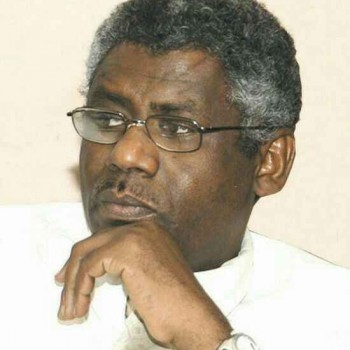As I see it… The time of William Andrea.. An Image of a murder of A singer (3/3)

Adel Al-Baz
Yesterday we saw how the famous singer and basketball player, “William Andrea”, was killed, who terrified the capital with his loss in the midst of the events that took place in the mid-seventies of the last century (1976), and was known as the “July Movement” or the “Mercenary Movement”. The writer Dr. Hassan Al-Jazouli, after narrating the events of those events, preferred to introduce us to the personality of “William Andrea”.. Who is he? What are his talents? And how did he enrich Sudanese life as an a singer ?
The writer says: “The Brown skinned boy nicknamed the Brown Gazelle was born on May 13, 1951 in the Khartoum West area, and his father is Andrea Faiz Nassar, a Sudanese national from South Sudan.
His paternal grandfather was a Christian doctor who worked in the south and married a Sudanese woman and had children with her, including Andrea. His mother was born in Gadarif and her mother was born in Musallamah.
The writer traces the biography of “William Andrea” with astonishing details that indicate his superior ability to investigate the information on the topics he writes about in depth. Since this place does not allow for presenting those details, we refer the reader to the book “The Time of William Andrea”, in which he will find special pleasure in the writer’s skill in describing and drawing the details of William Andrea’s life.
William Andrea’s star shone as a basketball player, guitarist and singer who followed the Sea Scouts before joining the “Shashati” group, which was one of the most prominent elite singing groups. William studied at the Institute of Music and Theater, but he passed away before completing his studies.
The writer mentions that the institute honored him by graduating with his class (1976), which included Abu Arki Al-Bakhit, singer Hayat Talsam, and Ahmed Rabsha.
William founded the band “Up Naid” and his most famous song that was popular in the seventies was ( enough jokes )which was written by his friend Ahmed Rostom, who says in the beginning: “We didn’t say enough jokes and let the night be morning.. I turn to rest and heal the wounds in my heart.” The youth of the seventies sang that song and danced to its rhythm at a time when William was a star in Khartoum nights.
The writer told the story of that song and then listed the most important songs that the deceased sang, most of which were songs in English, as was the custom of the jazz bands that were famous at that time (Al-Aqrab ( scorpions) Al-Diyum, Omdurman Jazz Band, and others).
The writer took us on a tour of the cultural life at that time, referring to the films that were shown in movies at that time: “The Deer Hunter” by Robert De Niro, “Zaruba Al-Yuwani” by Anthony Quinn, “Homecoming” by Jane Fonda, and others. Then he delved into reviewing the days of serious and useful television and radio programs (Beit Al-Jack, Hamdi Badr Al-Din, Soor Shaabiya, and Mutawakil Kamal).
Then he looked at the theater where “Nabta Habibiti ” and Hashim Siddiq and Mekki Sanada were shining, in addition to the vibrant world of singing with Wad Al-Amin, Zidan, and Osman Hussein.
The writer did not forget those cultural clubs that were bustling with life (Omdurman Club, Abu Rouf Club, and Al-Diyum Club). May Allah protect those days, for the writer of this article enjoyed those worlds and enjoyed those films, toured the cultural clubs, and enjoyed singing concerts, and now I can almost smell the fragrance of those days and places.
Thank you Hassan Al-Jazouli, it is a book worth reading for its enjoyment and benefit, and thanks to “Madarek” which always gives us the best of the harvest of the presses, and how could it not when its author is the sensitive and profound poet Elias Fath Al-Rahman.



